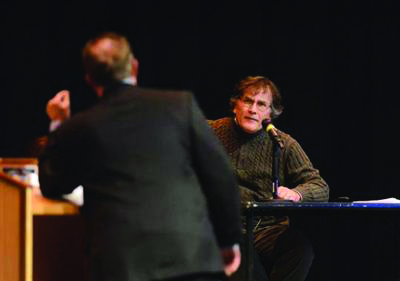By Ollie Gratzinger | Opinions Editor
In 1963, Stephen Hawking was given only a few years to live following a diagnosis of amyotrophic lateral sclerosis, colloquially known as Lou Gehrig’s disease. A few years became 55, and the young, talented student became the Lucasian Professor of Mathematics at Cambridge University — a position once held by Sir Isaac Newton — and, later, one of the most famous scientists in the world. After decades of discovery, curiosity, determination and an inspiring sense of humanity and humor, Hawking died in the early hours of Wednesday morning at age 76.
Hawking was best known for his startling brilliance and keen scientific eye, with his work in quantum theory and black hole mechanics coming to redefine the course of modern physics. But Hawking was not just a scientist.
According to a statement given by his three children, Hawking once said, “It would not be much of a universe if it wasn’t home to the people you love.” Hawking was an inspiration to the common soul, a paragon of human fortitude and a rare example of a man who was not only exceedingly great, but also fundamentally good.
Perhaps now more than ever, we live in a time during which science and goodness alike are threatened by the powers that be, and very real, dangerous issues are overlooked and pointedly dismissed. In the past, Hawking spoke out against President Trump’s decision to withdraw from the Paris Agreement — a decision which Trump claimed would be counterintuitive to his (problematic) America First policy.
Hawking maintained that the action would cause “avoidable environmental damage,” according to BBC News. (The United States will become the only country that isn’t part of the Agreement, with even North Korea and Syria taking part.)
Hawking was also an active voice in the argument against nuclear war, citing it as one of the greatest dangers to the survival of the human race. Among other threats, Hawking warned of asteroid impacts, global pandemics and the consequences of stepping too far into artificial intelligence.
Even though Hawking’s passing brings great grief to the scientific community and beyond, it is imperative that we heed his words as the climate change argument intensifies, and as the threat of nuclear fallout looms like storm clouds overhead. His legacy will live on in the discoveries he made and the books he wrote, but to honor the good man behind the great mind, we ought to uphold the values he stood for. Included in Hawking’s ideals were the preservation and funding of science, political and social literacy and education as a remedy to ignorance.
It’s no secret that President Trump has made plans to cut the endowments provided to certain institutions that support arts and humanities, but with a Commander in Chief who tweets unscientific, ignorant nonsense such as, “Perhaps we could use a little bit of that good old Global Warming that our Country, but not other countries, was going to pay TRILLIONS OF DOLLARS to protect against. Bundle up!” the prospects of American scientific advancement appear to be a little bleak. To deny something as catastrophic as global warming can and likely will, as Hawking once said, have cataclysmic and irreversible consequences on the only planet we’ve got.
As if that isn’t bad enough, an early draft of President Trump’s 2019 budget plan included a proposal that would essentially put an end to the funds going toward the International Space Station (ISS) by the mid-2020s, as the Obama-era protections expire in 2024, favoring instead a more privatized approach to American space exploration.
Every day, we inch closer to a dark reality in which political demagogues forsake science and condemn the research of brilliant minds. If for no other reason than to honor the legacy of the late Stephen Hawking, we as a society must be tasked with stepping up and challenging the administration’s anti-science rhetoric, so that humanity may live on to venture boldly into the dreamlike cosmos.




